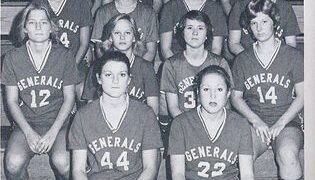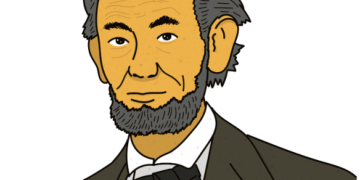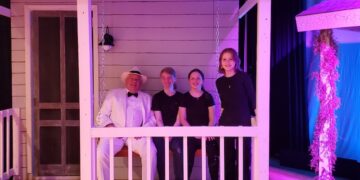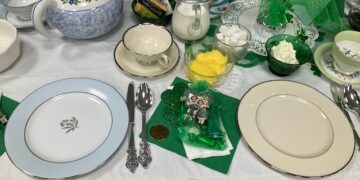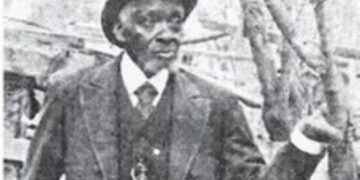James McBride and The Heaven & Earth Grocery Store (2023)
James McBride’s recent novel, like his memoir, The Color of Water (1996), shows both his deep understanding of the Jewish culture into which his mother was born and the Black culture in which he grew up. His mother, a Polish immigrant, born Ruchel Zylska, was the daughter of an Orthodox Jewish rabbi; she married two Black men, Andrew McBride and Hunter Jordan, and gave birth to twelve children. Emphasizing the importance of discipline and education, she raised them to become doctors, professors, chemists, and teachers.
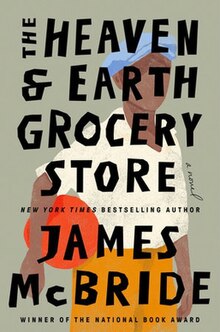
Banned by her family because of her marriage to McBride, Ruth Jordan told her children almost nothing about her Jewish background and they grew up considering themselves Black–sometimes ashamed of their White mother. As an adult, James McBride forced her to tell her story. In retrospect, he has said, “Now as a grown man, I feel privileged to have come from two worlds. My view of the world is not merely that of a black man but that of a black man with something of a Jewish soul.” Revelations about his mother’s background and his years growing up in a huge family underlie his memoir, The Color of Water, a work that garnered McBride huge success and launched his writing career. The Heaven & Earth Grocery also carries the influence of his racial duality.
McBride was fascinated with music from an early age but, encouraged by his mother to have a back-up if he didn’t achieve success in music, he graduated first from Oberlin College in 1979 and then from the Columbia University Graduate School of Journalism in 1980. His first jobs were in journalism, but he has maintained his interest jn music through the years, most recently as a tenor saxophonist in a group of writers who are also musicians. He has played jazz with other musicians, written songs, and received awards for his work in music.
Since 2002, McBride has also written seven novels; his first, Miracle of St. Anna (2002), was adapted into a movie with the same title in 2008. Spike Lee directed it. He and Lee co-wrote and co-produced another movie, Red Hook Summer in 2012. Song Yet Sung (2008) features a character partly based on Harriet Tubman and her devotion to freeing enslaved people. The villain of the novel is the notorious Patty Cannon from Maryland’s Eastern Shore.
His 2013 novel, The Good Lord Bird, fictionalizes the life of abolitionist John Brown. It won the National Book Award that same year. Another major award came to McBride in 2016 when President Barack Obama awarded him the 2015 National Humanities Medal. In October 2018, James McBride was the first writer in the John Grisham Writers Hour at James Madison University. The conversation between McBride and Grisham was outstanding Today, McBride continues to live, write, and play music in New York City.
McBride’s most recent novel, The Heaven & Earth Grocery Store, is set in Pottstown, Pennsylvania, in Chicken Hill, a working class neighborhood primarily inhabited by Blacks who have emigrated from the South and Jews recently immigrated from Europe, some partly impelled by the rise of Hitler. The time is the mid-1930s.
McBride peoples his novel with a wide variety of Black and Jewish characters—almost too many, in fact,–who interact primarily though the central characters, Moshe and Chona Ludlow, the owners of the Heaven & Earth Grocery Store. The store offers kosher food and warmth and kindness, for, as McBride writes, Chona adheres to the “seven requirements of Jewish life: wisdom, meekness, fear of God, love of truth, love of people, possession of a good name, and dislike of money.” McBride partly based Chona on the Jewish grandmother he never met. She, like Chona was the rock of her family, but in poor health and mistreated by a husband who didn’t love her. Unlike McBride’s grandfather, Moshe in the novel shares Chona’s warmth, loves her completely, and is devastated by her failing health.
Chona, almost the epitome of virtue, is crippled but caring, both the center of her husband’s life and an inspiration to the Black community that operates under Jim Crow laws. The couple’s best friends are the Black couple who work for them, Nate and Addie Timblin. The town physician, Doc Roberts, epitomizes White oppression in town; he is, in fact, the only fully developed white character in the novel and his evil is palpable.
Moshe operates a local community theatre that features both travelling Jewish entertainers and Jazz musicians, reflecting McBride’s personal interest in music. The plot evolves when the childless couples—the Timblins and the Ludlows–assume responsibility for a black child, orphaned and profoundly deaf. They temporarily save him from the State which decides he needs to be institutionalized. When the boy is caught and put into a facility after melodramatic events in the Ludlow’s store, McBride describes the horrible mistreatment of the handicapped that continued in the first half of the 20th century. He also comments on racism against both Blacks and Jews, but his outlook is essentially hopeful as he shows genuine love within the community. Among other honors, the novel was a New York Times best seller and the winner of the 2024 Library of Congress Prize for Fiction.






